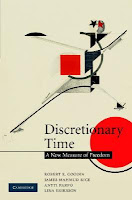Beyond Capitalist-Attenuated Time [updated]
What
follows—in the hope of whetting your appetite—is the tentative epigraph and apologia
to my forthcoming (and comparatively short!) bibliography: Beyond Capitalist-Attenuated
Time: Freedom, Leisure, and Self-Realization.
“The wealthiest and most powerful nation in the world may be the poorest in what was supremely precious to the highest cultures of classical antiquity and the renaissance of world history—the availability of time for thought and contemplation, for relaxation and creative work, for conversation and study, for love and friendship, for the enjoyment of the arts and the beauties of nature, for solitude and communion, for doubts and dreams. There is little room or time for indolence and excellence, for salons and coffeehouses and the market-place, for laughter and tears, for poetry and philosophy, for song and dance and worship, for birds and beasts, for sleep and convalescence, for birth and death; time to live and enough time to dwell on eternity. Can the mere availability of more time teach the most time-saving society in history how to spend time, how to transcend it, and how to appreciate timelessness?” — Raghavan Iyer, from the essay, “An Unfinished Dream,” in his book, Parapolitics: Toward the City of Man (Oxford University Press, 1979): 299-331. This chapter discusses the Guaranteed Annual Income (or ‘basic income’) proposal in light of Edward Bellamy’s utopian novel, Looking Backward (1888).
Apologia: This compilation assumes there are several profound truths and urgent questions embodied in our epigraph. In addition to works that more or less directly address topics in the title, I’ve included material that treats—in whole or part—philosophical and psychological presuppositions and assumptions intrinsic to exploring the subject of “free” or discretionary time, human fulfillment, and self-realization.
Update: While doing (occasional) research for the bibliography, I dimly recalled a book I’d read some years ago, thinking it might contain some relevant material owing to (what I did remember as) its brilliant analytical and historical treatment of “abstract” and “concrete” time in the light of Marx’s critique of capitalism. Oh my, it sure does! I’ve been reading it afresh (quickly for now, with more care later) and quite thankful it came to mind. The book? Moishe Postone’s Time, Labor, and Social Domination: A reinterpretation of Marx’s critical theory (Cambridge University Press, 1993).
“The wealthiest and most powerful nation in the world may be the poorest in what was supremely precious to the highest cultures of classical antiquity and the renaissance of world history—the availability of time for thought and contemplation, for relaxation and creative work, for conversation and study, for love and friendship, for the enjoyment of the arts and the beauties of nature, for solitude and communion, for doubts and dreams. There is little room or time for indolence and excellence, for salons and coffeehouses and the market-place, for laughter and tears, for poetry and philosophy, for song and dance and worship, for birds and beasts, for sleep and convalescence, for birth and death; time to live and enough time to dwell on eternity. Can the mere availability of more time teach the most time-saving society in history how to spend time, how to transcend it, and how to appreciate timelessness?” — Raghavan Iyer, from the essay, “An Unfinished Dream,” in his book, Parapolitics: Toward the City of Man (Oxford University Press, 1979): 299-331. This chapter discusses the Guaranteed Annual Income (or ‘basic income’) proposal in light of Edward Bellamy’s utopian novel, Looking Backward (1888).
Apologia: This compilation assumes there are several profound truths and urgent questions embodied in our epigraph. In addition to works that more or less directly address topics in the title, I’ve included material that treats—in whole or part—philosophical and psychological presuppositions and assumptions intrinsic to exploring the subject of “free” or discretionary time, human fulfillment, and self-realization.
Update: While doing (occasional) research for the bibliography, I dimly recalled a book I’d read some years ago, thinking it might contain some relevant material owing to (what I did remember as) its brilliant analytical and historical treatment of “abstract” and “concrete” time in the light of Marx’s critique of capitalism. Oh my, it sure does! I’ve been reading it afresh (quickly for now, with more care later) and quite thankful it came to mind. The book? Moishe Postone’s Time, Labor, and Social Domination: A reinterpretation of Marx’s critical theory (Cambridge University Press, 1993).











0 Comments:
Post a Comment
<< Home